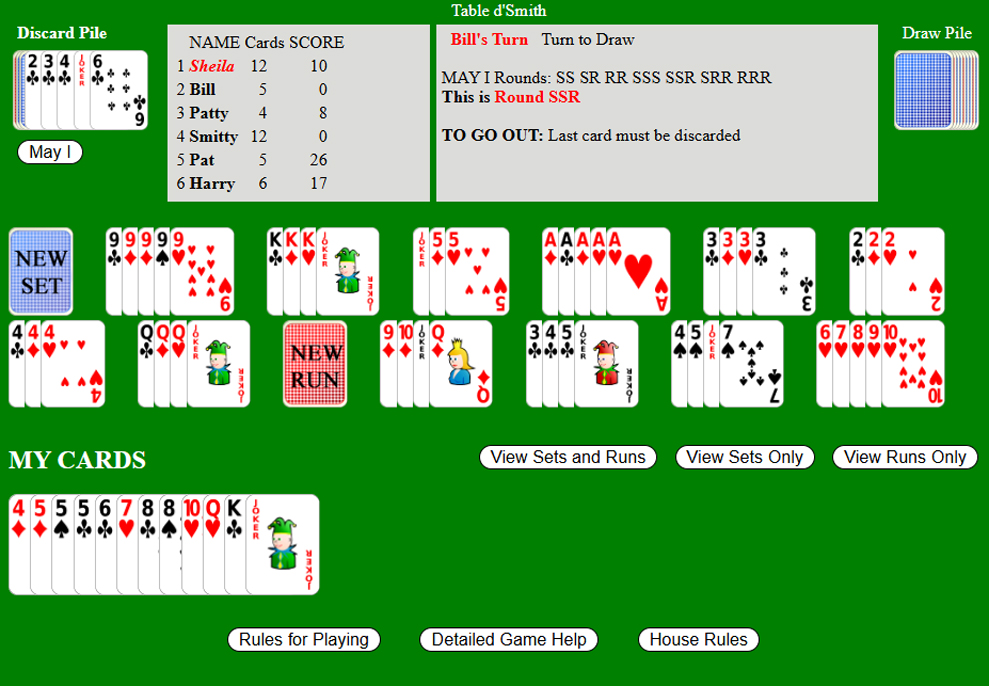Bill's Rummy Card Game
This game is in development, and is not available yet.

Bill's Rummy Card Game is a fun game played online by 2, 3, 4, 5 or 6 players.
Fun card game played online by either 2, 3, 4, 5, or 6 people. Rummy games are built around books made up of sets and runs. Sets are 3 or more cards of the same rank (such as Queen of Diamonds, Queen of Spades, and Queen of Hearts). Runs are 4 or more cards of the same suit where the individual cards form a sequence (such as 4 of Clubs, 5 of Clubs, 6 of Clubs, and 7 of Clubs). Like most of the rummy variations, this game does not support partner or team play.
Host chooses which of 3 Rummy games to play: a classic style Rummy game (sets and runs); May I (a basic Contract Rummy game); or 7 Goals (a variation of Contract Rummy). Classic Rummy games have the same goals for starting new sets and runs each round. Contract Rummy games have different goals for each round.
All rounds end when one player has played all the cards in their hand. Cards are used to start new sets and runs, played on existing sets and runs, or discarded. When someone goes out, all other players are penalized points based on the number and rank of the cards left in their hands. These scores are accumulated from round to round.
Classic Rummy uses 1 deck for up to 4 players, and 2 decks for 5 or 6 players. Players start new sets and runs, and play cards on existing table sets and runs. House rules determine whether they must start at least one new set or run before playing cards on existing sets and runs, and what limits apply to starting new books (sets and runs) each turn. For example, how many books can a player start each turn; and are they allowed to start additional books on their initial meld. Games end when a specific number of rounds have been completed. The number of cards dealt to each player depend upon the number of players: 10 cards each for 2 players, 7 cards each for 3 to 6 players.
May I uses 2 decks. Each round has a specific goal which must be met in a single turn. Once a player meets that goal, then they may play the rest of their cards on any of the existing sets and runs. They can not start any new sets or runs once the initial goal has been reached. All players advance to the next round regardless of whether they met the previous round's goal. Each game consists of 7 rounds. If enabled by the Host, the May I game supports asking for the top card off the discard pile. If no one with higher priority wants it, then the player will get it at the start of their next turn (plus penalty cards as set by host). The active player has first call on taking the top card from the discard pile. The player whose turn is next has 2nd call, etc. The lowest priority would be the person who discarded the card - but they are not allowed to ask (May I) for the card they just discared. The seven goals are: SS, SR, RR, SSS, SSR, SRR, and RRR which represent sets and runs that each player must start. 10 cards are dealt to each player for the first four rounds, and 12 cards are dealt to each player for the last 3 rounds.
7 Goals uses 2 decks. There are 7 specific goals which each player must complete in order. Players can only complete one goal per round. Once a player meets that goal, then they may play the rest of their cards on any of the existing sets and runs. They can not start any new sets or runs once the initial goal has been reached. If the player completes that goal, then they can advance to the next goal on the next round. If they don't complete the goal, then they must work on that same goal again the next round. Games end when one or more players complete the 7th goal (however many rounds that may take). The seven goals are SS, SR, R-7, R-9, 7-Suit, S-5-3, and R-5-4. 10 cards are dealt to each player each round.
Table host sets the house rules which include such things as whether to reshuffle the Discard Pile if the Draw Pile runs low; whether wilds can be used; whether wilds can be picked up by playing the card that the wild was representing; whether Aces are considered High or Low, whether cards in Runs must all be the same suit, etc. Some rules only apply to specific games (classic Rummy, May I, or 7 Goals).
The winner in Classic Rummy games and May I games is the player with the lowest score. The winner in 7 Goals is the player who completes all 7 goals (in the event of two or more players completing all 7 goals the same round, the winner is whichever player who completed all goals has the lowest score).
Cost? Table hosts pay $48 for a full year to host a table. Host then invites 1-6 guests to play online. Guests do not pay anything - only the host pays. Try 2 weeks for only $2 to see if you like the game. Host fee allows you to host 1 table, which can be used to play any of our games ( Hand and Foot, Pinochle, 6 Card Golf, Up and Down the River, Lucky Paw, TallyHo the Marble game, Route 66, and Rummy ). Only 1 game of any type can be played at a time. Contact HostaGame @ northwestpages.com for details.
| Contact Northwest Pages | Privacy Statement | Other links |
